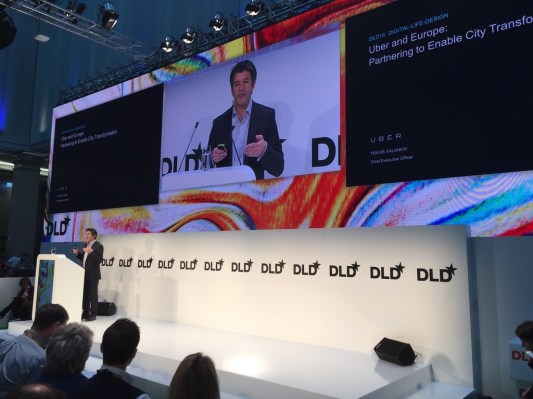Speaking at the DLD conference in Munich today, Uber CEO and co-founder Travis Kalanick sang a rather different tune than he has of late. In recent times, the service has been fighting fires on a number of fronts, from controversies about its relationship with the media, to the safety of its riders, both in the US and in emerging markets.
This time, however, Kalanick sounded a far more conciliatory note, perhaps given that the DLD audience is packed with European bigwigs. Among the entrepreneurs and investors are also EU regulators and representatives from various European governments. They listened keenly, as, amid the dizzying facts and figures about Uber’s hyper growth, Kalanick also peppered his speech with a two-pronged message, with one proviso — that Uber can help solve Europe’s unemployment problem and help it meet it’s environmental targets. The catch? To paraphrase: ‘Work with us.’
He argued that the economics of Uber’s model could ultimately solve a raft of problems in the world’s cities. As its network grows, more cars mean more availability of pickup times, therefore more trips per hour, increasing the efficiency of the network as it grows.
With ‘Uber Pool’, he argued, where two people take the same trip in the same car, the result is to take one car off the road and remove that congestion from traffic. The more people taking Uber means the fewer cars there are sitting around unused in parking lots. This “perpetual ride” means drivers always have work — “almost like a private bus but on demand and convenient,” he said. Eventually his hope is that the cost of taking an Uber regularly will fall to below the overall cost of owning a private car.
This matters because “there are a billion cars, with 96 percent of them not utilised, despite there being a huge infrastructure for cars.” Cars are supported by $30 trillion in assets, with 350 million care in Europe alone. Plus you spend 2 percent of your life sitting in one, he said.
In San Francisco, after four-and-a-half years of operation, he said 1.6 million people had now used Uber, and the service had created 7,500 new jobs (he neglected to comment on whether local taxi firms had lost drivers to the service). In New York they now had 3.9 million riders, and had “created 13,750 jobs.” In London they had almost 1 million riders and created 78 full-time jobs (clearly London’s famous black cabs still have the lion’s share of the market). They had created 3,700 jobs in Paris, he said.
Uber has been fighting many city regulators, especially in Europe, but Kalanick effectively offered an olive branch.
“If we could go to the mayor of a city and find a way to partner, we could promise to create 10,000 new jobs inside four years,” he said.
He argued that the artificial scarcity created by city licensing of taxi firms is holding back both the transportation industry and jobs growth, as well as tackling environmental concerns over city pollution.
It costs a licensed taxi driver an average $40,000 a year for the privilege of running that car. For that privilege “he gets to be impoverished,” claimed Kalanick (admittedly this would depend on the city).
He said city fathers should unlock competition in their cities — though clearly it’s in his interest to argue thus.
However, he did hint that Uber could be just one platform drivers could choose to work for — though presumably he plans to own a good portion of this market.
That said, his argument is a persuasive one: Most taxi-driven cities are currently “off-the-grid industries,” he argued. Firms that are “on the grid” — meaning trackable taxi and private cars apps like his — could increase regulatory compliance and driver safety, as well as increase tax revenue, because of the inherent tracking capabilities of these kinds of apps.
In 2014, Uber had “worked with 22 jurisdictions” to pass laws to enable private car hire apps. “In 2015 we want to establish a new partnership with EU cities and help build the smart cities of tomorrow.” At stake, he said, was the building out of new technologies and a “massive economic benefit.”
Uber could create 50,000 new European jobs in one year, said Kalanick, and take 400,000 cars off the roads — if he could get buy-in from regulators.
Whatever happens, Kalanick said, in 2015, “I will spend more time here.” This is probably one promise he will be able to keep. It’s in his interests to.
